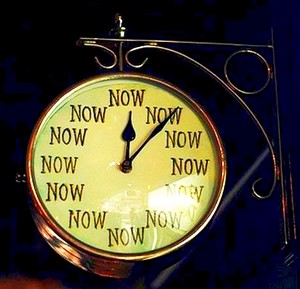
It's always now.
To Calvin and Newton, time was like a Cartesian fourth dimension. Events of the past existed in the temporal dimension as well as events in the future. God, being the unlimited supreme being, could see the past and the future, unlike mortals. If a person now living, at some future time should be in Heaven, then it was predestined for that person to go to Heaven after he died, and nothing could change that. Events were as if they were "frozen" in the four dimensional spacetime. Those people in Heaven in the future were referred to by the Calvinists as the "elect," and everyone else was "reprobate."
However, in reality, only the present exists. Conceptions of the past and future are ideas, mental constructions that may be more or less accurate, depending on the information and computational power available to the conceiver. Conceptualizations of the future have no basis in fact. Modern theory has shown that the future is not, even in principle, predictable, while the past cannot be fully reconstructable. The fact that it cannot be known what we will do in the future is one piece of evidence in the argument for free will. It doesn't prove we are free, but it does prove that we don't have predetermined ("slave"?) will, which amounts to the same thing. That is, if it can't be predicted what we will do, then there is no way to predetermine what we will do.
This would all be merely philosophical disputation if it weren't for one thing: power. It turns out that Calvin, and hence, all Calvinists, was very influential in the Reformation of the Protestant Churches, especially among the colonizers of foreign lands. The Puritans founded the early colonies in North America, for example, and the Episcopalian Church (the American branch of the Anglican Church) was strongly influenced by Calvinism. Scottish and Continental churches were also strongly influenced by this false ideology.
So it's fairly easy to see how the false notions of Calvinism devolve into social pathology. The elect are the beneficiaries of the grace of god while others are not. They can be distinguished from the others by their relative prosperity. The wealthy deserve what they get because they are chosen by God over all others. The rich have no responsibility to help the poor because it's God's will that they have no favor. Selfishness and abuse are justified. This cultural attitude sets the stage for contemporary Ayn Randian "I've got mine, screw everyone else" Repugliganism.*
The Ayn Rand "philosophy" (she, like Frederick Nietzsche, was not actually a philosopher, but a social critic) is one of individualism supreme over the community. In her view, the ideal society is a collection of loners, each going his own way to advance his own vision. Something very big is missing, isn't it?
Humans are not tabula rasa, a view that has been in vogue with some ideologues. People are community beings, and some of those with no sense of community we label sociopaths.
* I coined the term "Repugligan" in much the same way that C. S. Lewis chose the name of "Screwtape." It's a conglomeration of "repugnant ugly thugs and hooligans." It's meant to convey the blatant disregard of society and culture of contemporary Republicanism in the USA.

 Email Richard dot J dot Wagner at gmail dot com
Email Richard dot J dot Wagner at gmail dot com
Calvin.html
This hand-crafted HTML file was created August 17, 2009, by
Rick Wagner,
and last updated November 28, 2018 by Rick Wagner.
Copyright © 2009-2018 by Rick Wagner, all rights reserved.